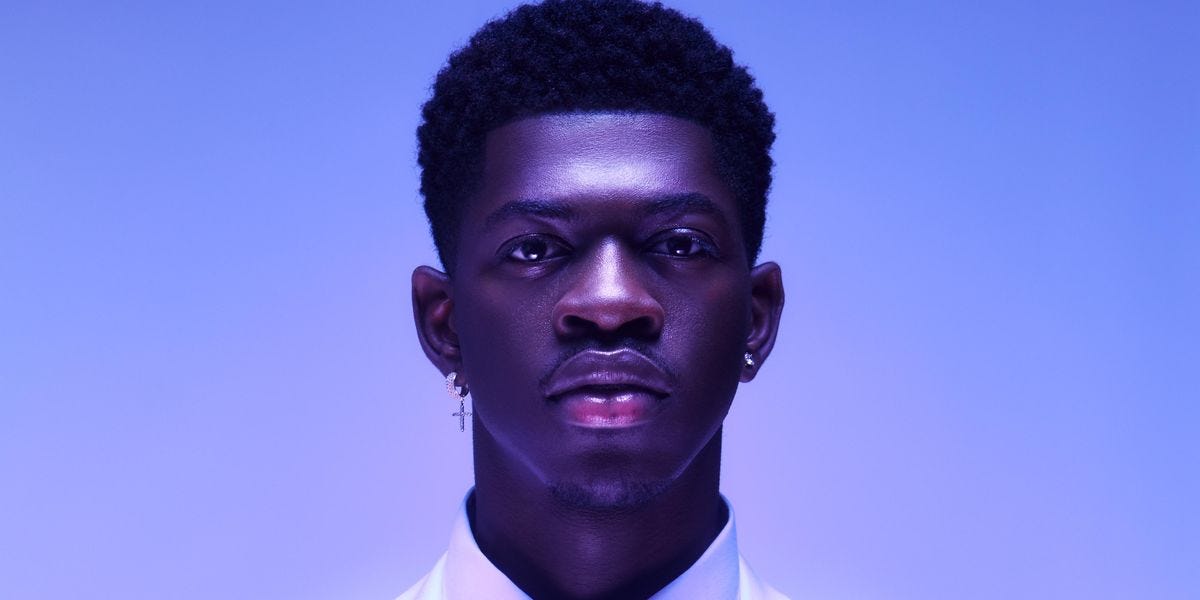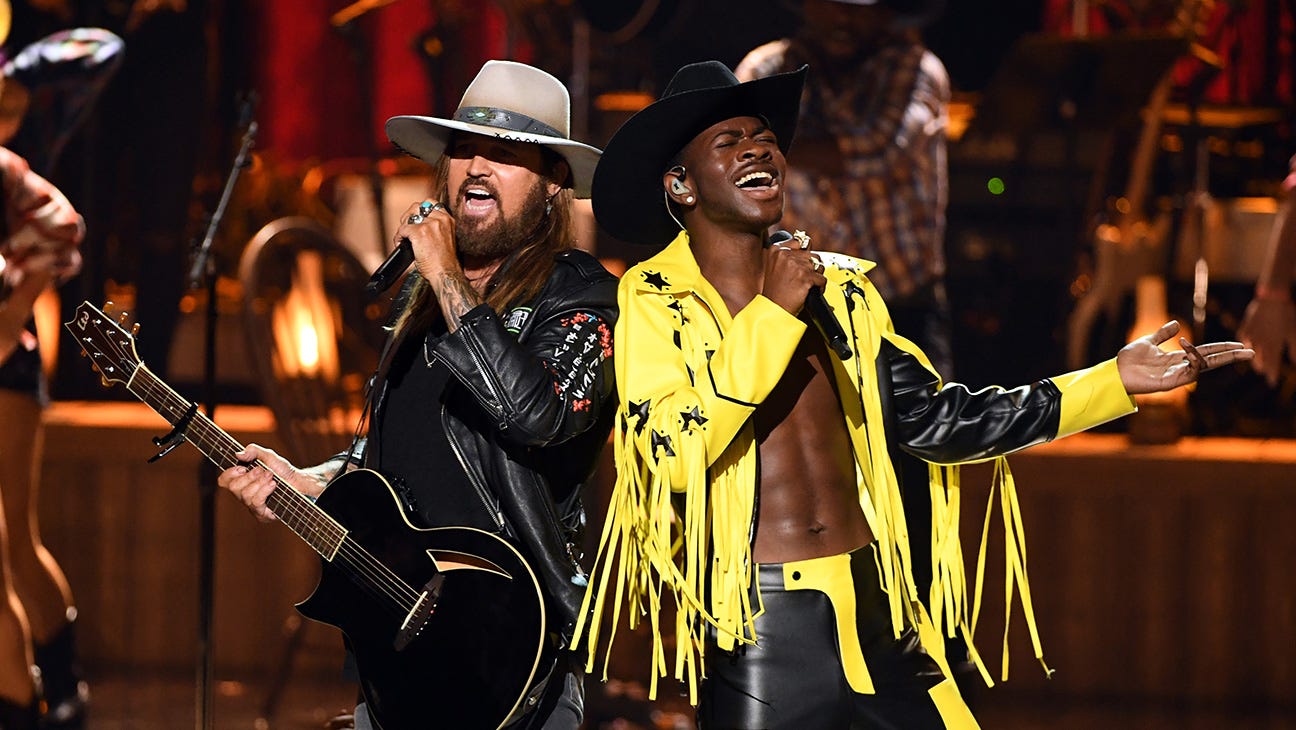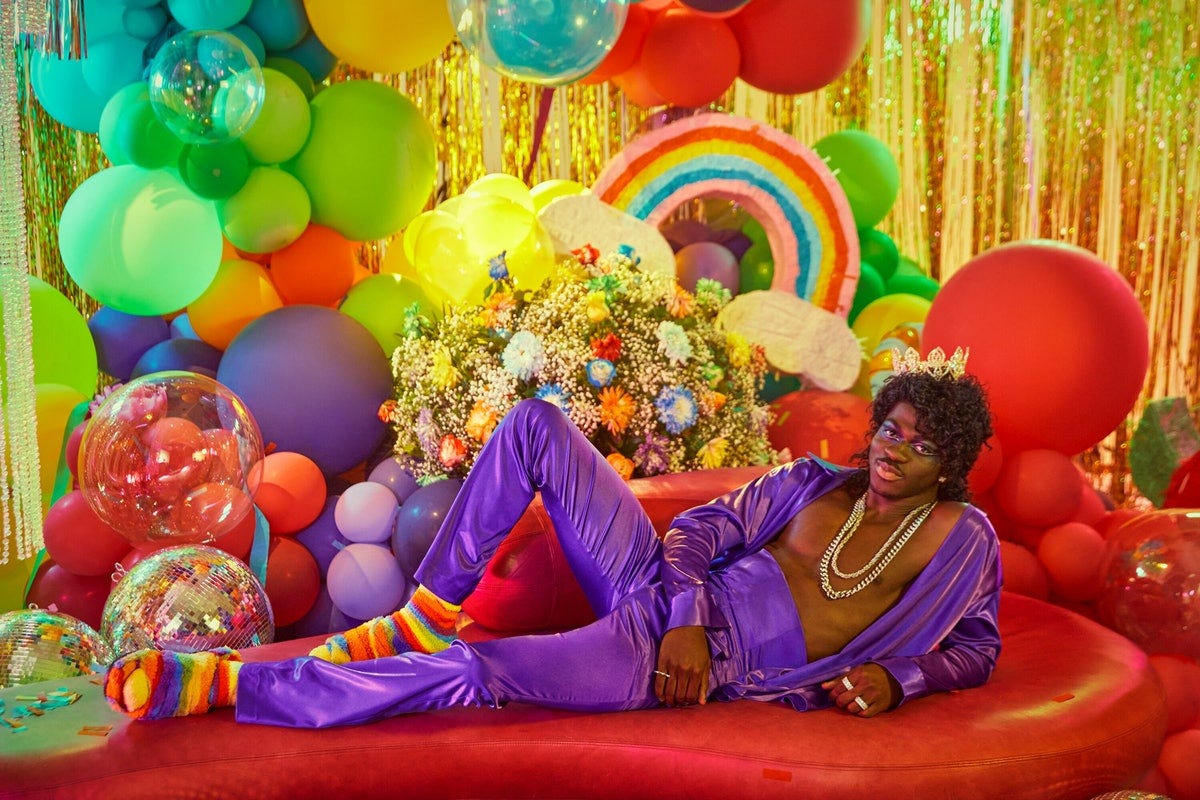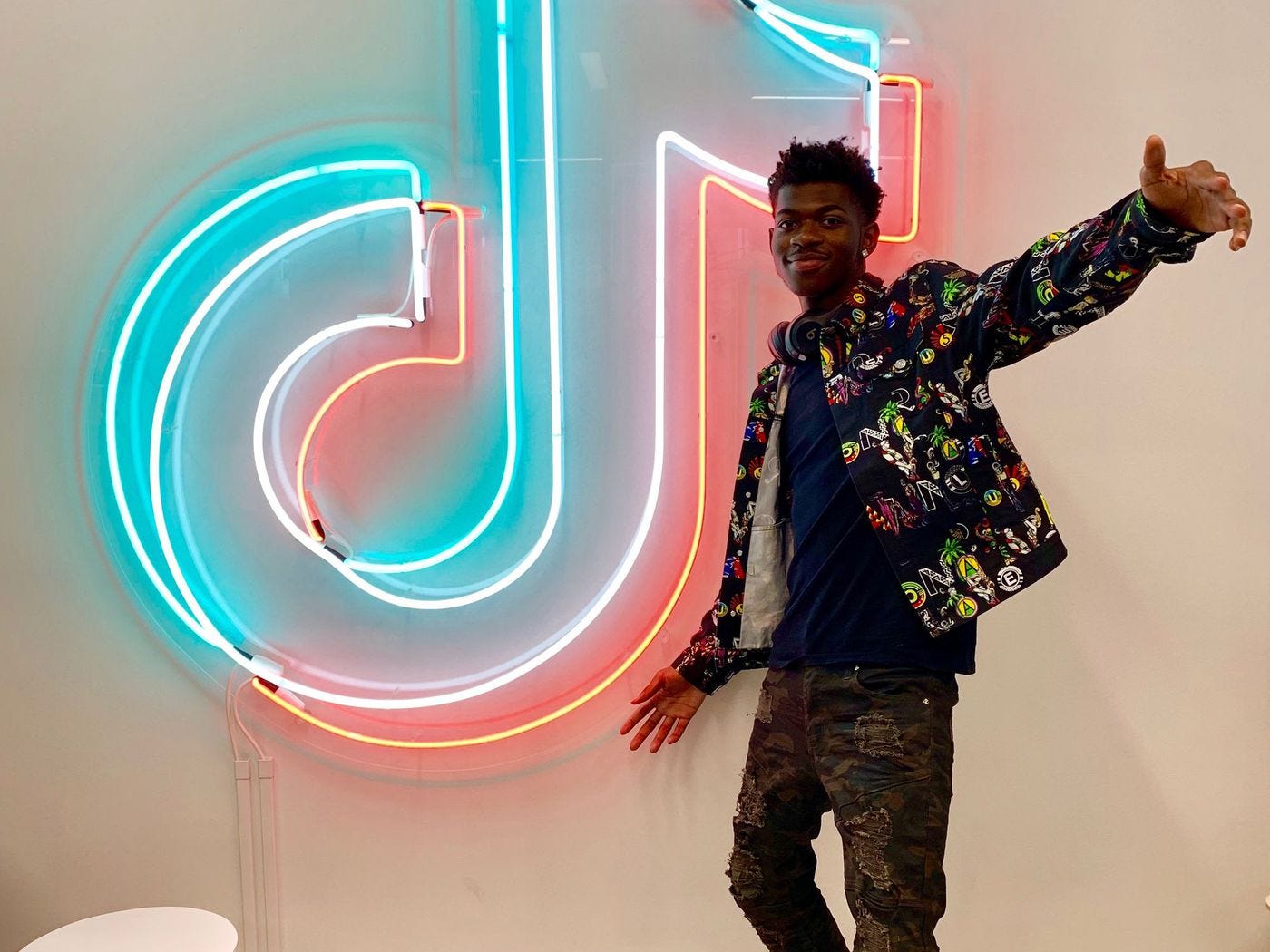Lil Nas X Is Gen Z's Defining Icon
How Lil Nas X Uses the Internet to Change Culture
This is a weekly newsletter about how culture and technology intersect. To receive this newsletter in your inbox each week, subscribe here:
Lil Nas X Is Gen Z's Defining Icon
In January 2019, Lil Nas X was a college dropout sleeping on his sister’s couch, with -$5.62 in his Wells Fargo account. Five months later, he’d broken Mariah Carey’s record for the most consecutive weeks at #1 on the Billboard Hot 100.
Lil Nas X achieved his success through his own hustle and savvy. He told one reporter, “A lot of people like to say ‘a kid accidentally got lucky.’ No. This was no accident.”
Lil Nas X embodies Gen Z in his scrappiness, in his fluency in internet culture, and in his unapologetic self-expression. This week, I’ll chart his rise as a digitally-native superstar, and then step back to examine how he represents his generation.
Let’s dive in.
Growth Hacking 🤝 Music
Lil Nas X grew up online, crafting and honing a deep understanding of internet culture. Before turning to music, he ran a Twitter meme account with 30K followers. He also managed several large Nicki Minaj fan accounts (more on that later). He had a natural instinct for what content would go viral.
In late 2018, Lil Nas X decided to use his online platforms to promote his music. But he knew that his music had to be tailor-made for the internet. In his words: “It had to be short. It had to be catchy. It had to be funny.”
He started by buying the beat for “Old Town Road” for $30 on BeatStars, where a Dutch teenager named Kiowa Roukema had uploaded it. Yes, the beat to the longest-running #1 in history was bought online for $30.
Then, Lil Nas X wrote a song wired for the streaming age. Today’s music charts are heavily influenced by the number of times a song is streamed. Shorter songs get streamed more, which incentivizes artists to release shorter music. Understanding this, Lil Nas X wrote the original version of “Old Town Road” to be just 1:53.
Streams on Spotify are counted after 30 seconds of listening. Traditionally, a song’s chorus hits around 45 seconds into a song and is relatively short. Lil Nas X made the “Old Town Road” chorus drop just 13 seconds into the song and last for over 30 seconds, ensuring the song would rack up streams.
Finally, Lil Nas X added lyrics that were built for virality, fusing country and rap. The song was good to go:
✅ Short song
✅ Early and lengthy chorus
✅ Viral lyrics
Now it was time to seed it across the internet. Lil Nas X created memes and planted them online. On December 2, 2018, he tweeted the first viral meme:
In the age of TikTok, songs are often recognized by their lyrics. Under a fake account, Lil Nas X asked on Reddit, “What’s the name of the song that goes ‘take my horse to the old town road?’” He knew that when people Googled the lyrics after seeing viral memes, they’d find the Reddit thread with the song’s name.
For a time, Lil Nas X even changed the song title to “Old Town Road (I got the horses in the back)”. Adding viral lyrics to song titles would become commonplace in 2020—doing so helps people find popular TikTok songs—but at the time it was groundbreaking.
In April, Billboard removed “Old Town Road” from the country charts, saying the song, “does not embrace enough elements of today’s country music to chart in its current version.” Many saw this (rightfully) as mainstream country’s rejection of a Black artist. The Billboard charts have long had a fraught relationship with race: the R&B chart, for instance, was originally titled “race music”; the Latin songs chart lumps together a dozen genres into one ethnic category. Even bona fide superstars have faced resistance: Beyoncé tried to submit her Lemonade track “Daddy Lessons” as a country song, but was rejected.
Lil Nas X was unperturbed. He responded to Billboard saying he wasn’t country enough by lining up a remix with the most country of country singers: Billy Ray Cyrus. (Fun fact: Lil Nas X knew of Billy Ray because he’d watched Hannah Montana growing up.) Their remix hit #1 on the Billboard Hot 100 and remained at the top for 19 weeks, breaking Mariah Carey’s 16-week record.
Lil Nas X manifested his rise. His success was meticulously planned—the proof is public, strewn across the internet in his tweets and memes and Reddit posts.
Most people underestimated Lil Nas X and expected him to be a one-hit wonder, but he made sure to firmly embed himself in pop culture. In March 2021, he again took the world by storm with “Montero (Call Me By Your Name)”—a song that debuted at #1 and that, to use the technical term, is an absolute banger.
The “Montero (Call Me By Your Name)” video was manufactured for virality. The basic premise is that Lil Nas X, portraying Eve in the Garden of Eden, is seduced by the snake and then killed for his sins. He then takes a stripper pole down to Hell, where he lap dances on Satan before murdering Satan and taking his crown.
The song and video, predictably, sparked outrage from the Catholic Church, ensuring free media coverage for days and keeping Lil Nas X firmly in the zeitgeist. During the controversy, the singer tweeted and memed non-stop, delighted that a song he wrote about gay sex had made it to #1 and pissed off religious conservatives.
He even managed to get sued by Nike for his “Satan Shoes”. The Satan shoes were made in collaboration with MSCHF and were said to contain a drop of real human blood. (The blood was apparently provided by members of the art collective, who said, “We love to sacrifice for our art.”) In under a minute, 666 pairs of the shoes sold for $1,018 each—a reference to the Bible passage Luke 10:18 that reads, “I saw Satan fall like lightning from heaven.”
Over the last decade in Silicon Valley, “growth hacking” has become a popular term. It refers to analytical, innovative, often unconventional ways to rapidly grow a startup. Lil Nas X took growth hacking and applied it to fame. When one thing meets another, Gen Zs often use the 🤝 emoji. Lil Nas X said: growth hacking 🤝 music. He took a playbook of scrappy, savvy, brilliant marketing tactics and applied them to a slow-moving legacy industry.
Lil Nas X didn’t get lucky. He didn’t get hand-picked by a record label executive in a suit. He manifested his own success with ambition, creativity, and an internet connection.
Gen Z Personified
If there were an award for the most-featured person in Digital Native article thumbnails, Lil Nas X would take the crown.
Okay, so he’s only been in three thumbnails—but that’s one more than runner-up Billie Eilish, who I’d argue is the other person who best embodies Gen Z. We can learn a lot from Lil Nas X about the creator economy, about Gen Z identity and self-expression, and about the first digitally-native generation.
Last week, Jazmine Hughes published a terrific piece in The New York Times Magazine, “The Subversive Joy of Lil Nas X’s Gay Pop Stardom.” It’s an excellent read. Hughes spends time with Lil Nas X in L.A., chronicling his upbringing and his current approach to fame. What’s striking is how much of his early life took place on the internet.
Lil Nas X was born Montero Lamar Hill and grew up in a public housing project in Atlanta. He and his five siblings shared a single bed with their grandmother. When Lil Nas X flew to L.A. to record “Old Town Road”, it was just his second time on a plane.
Lil Nas X spent most of his waking hours online, where he found refuge and community. He got really good at the internet—you can see his ease and comfort with digital communication today. He’s just plain funny.
In Hughes’ piece for The Times, Lil Nas X’s collaborators emphasize his fluency in digital language:
Just look at his tweets, they said—as deftly written and pored over as haikus. He writes them the way he writes his songs, pacing and structure and impact all top of mind, within tight constraints.
(The way Bach might’ve felt about counterpoint or Minaj feels about wordplay, Nas feels about capitalization, punctuation and rhythm, always knowing when the proper use of a period would ruin the joke.)
This excerpt reminded me of a piece I read last week titled, “What Does Gen Z Have Against Question Marks?” Gen Zs have a specific way of writing: question marks are unnecessary; capital letters are uncool; periods are harsh. Any young person reading this understands this language innately. It’s why, as the article notes, Gen Zs “maybe feel a touch of panic when their boss slacks them a message with something as seemingly mundane as a period at the end”. It’s why you have to coach your parents not to text you “k”, lest you think you’ve been disowned.
What’s fascinating about Lil Nas X is he speaks Gen Z culture fluently; he even helps create it. He effortlessly memes and tweets and posts to social platforms constantly, forging connections with fans and ensuring his own virality. More than any other Gen Z celebrity, he built his own success on the back of his understanding of digital culture.
Related to Lil Nas X’s internet prowess is his willingness and ability to fully express himself online. In the 17th week that “Old Town Road” was #1—the week that he broke Mariah Carey’s 16-week record—Lil Nas X came out as gay. He grew up with a deep shame, thinking that same-sex attraction was a test that God put in front of him to prove his devotion. (The “Montero” music video is a commentary on how Black and Catholic communities treat homosexuality.) Since coming out, Lil Nas X has become perhaps the most visibly queer artist ever. Hughes writes:
Coming out, for Nas, was a recalibration. He wanted to be not just a pop star but a visibly gay one, a figure built on that Gen Z tendency to heighten a sexual identity into an exaggerated shtick, but one founded on a genuine pride and comfort.
He’s unapologetically gay. Two weeks ago, he made out with one of his male back-up dancers during a BET Award performance. The backlash was swift. But Lil Nas X continues to push the boundaries of culture—Hughes notes:
It’s one thing to accept a gay person, as many do, by ignoring what we do behind closed doors. But it’s quite another to embrace gay people as sexual beings, who can also enact an identity—just as straight people so proudly, publicly and lucratively do.
Lil Nas X takes self-expression to a new level as a creator. In his song “HOLIDAY”, he sings, “I may bottom on the low, but I’m top shit.” He’s indicating that his preferred sexual position is “bottom”, but that with everything else in life he’s on top. Because of society’s warped view of masculinity, being a bottom is stigmatized—even within the queer community. But Lil Nas X derives power from it; and, naturally, he does so with humor and wit. Here, he takes Chimamanda Ngozi Adichie’s famous quote on feminism and replaces the word “girl” with “bottom”:
Though Lil Nas X is routinely criticized—Hughes notes that he measures criticism in the way any digital native would, in lost followers—he pushes forward:
During New York Pride, I walked through Washington Square Park and marveled at how diverse the celebration was. Openly gay and bi and trans people danced through the park and didn’t adhere to traditional stereotypes around queerness and masculinity and femininity. Most were Gen Zs, carefree and authentic and fluid and self-expressive. It was invigorating to see—and a far cry from Pride a decade ago.
In his queerness and Blackness—and crucially, in his queer Blackness—Lil Nas X is driving this cultural shift.
Final Thoughts
Lil Nas X is one of the first digitally-native superstars. He’s seven months younger than Google. When Facebook launched, he was four. When the iPhone came out, he was eight. He came of age online, fluent in digital culture.
There’s a reason that Gen Z’s defining personalities are musicians: Lil Nas X, Billie Eilish, Olivia Rodrigo. Music is set up for the velocity of creation and the ethos of authenticity of the digitally-native generation. More volume of content, and more relatable content.
Acting fame doesn’t translate—acting is about aspiration, about pretending to be someone else. The pace of creative output is low, and authenticity is lacking. The youngest “movie stars” that come to mind for me are Jennifer Lawrence, Emma Stone, Natalie Portman. All are north of 30. I have an easier time naming YouTubers and TikTokers.
Lil Nas X, as a musician, is built for Gen Z fame: he’s relatable; he’s vulnerable; he’s constantly, incessantly putting out content. He’s always had ambition—the “X” in Lil Nas X represents 10, the number of years he expected to elapse before he achieved global fame—and that ambition resonates with his generation. He used the internet and his own savvy to go from a public housing project in Atlanta to stardom.
Lil Nas X’s rise and appeal are clear in his lyrics to “Sun Goes Down”. He sings:
Since 10, I've been feelin’ lonely
Had friends but they was pickin’ on me
Always thinkin’, “Why my lips so big?”
Was I too dark? Can they sense my fears?
These gay thoughts would always haunt me
I prayed God would take it from me
Then he sings about how he found refuge in Nicki Minaj fandom online—remember, he ran fan accounts for Nicki.
I’d be by the phone
Stanning Nicki mornin’ into dawn
Only place I felt like I belonged
Strangers make you feel so loved, you know?
This is the internet at its best: connecting people and giving them community. This is the creator economy at its best. The lyrics speak to Lil Nas X as a digital native: he grew up online, stanning his favorite creators and finding belonging on the internet.
What’s remarkable about Lil Nas X is how he used technology to his benefit, plotting and then executing his own rise. Now, he has a legion of his own fans who look up to him and run Lil Nas X stan accounts. It’s his turn to inspire the next generation.
Sources & Additional Reading
The Subversive Joy of Lil Nas X’s Gay Pop Stardom | Jazmine Hughes
Lil Nas X’s Marketing Genius | MarketingExamples
How Lil Nas X Challenges the Catholic Church | Phillip Picardi
Lil Nas X’s ‘Old Town Road’ Was a Country Hit and Then Country Changed Its Mind | Elias Leight
Related Digital Native pieces:
Thanks for reading! Subscribe here to receive this newsletter in your inbox each week:
















